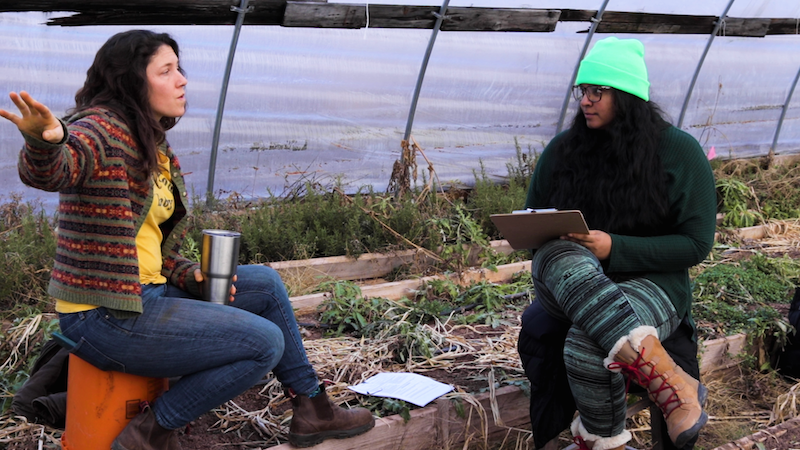Flashback to another time (Autumn, 2019): Two farmers inside a tunnel completing a peer inspection, without masks
When we asked the Certified Naturally Grown membership how we could better support them during the COVID-19 Pandemic, the number one request was for flexibility with CNG’s peer inspection requirement. People were concerned about the health risks posed by such a contagious virus. We wanted to help keep our members healthy, so we’ve granted flexibility with inspection deadlines as a stopgap solution.
But for the long run, it was important to investigate alternative, safe approaches to conducting peer inspections – ones that would protect the health and safety of our members. It seemed very unlikely the pandemic would just disappear in a few months. So we began to explore the option to conduct remote inspections via video call, where the farmer receiving the inspection gives a live virtual tour of their farm and fields questions from their peer inspector who is at another location.
In April and May we piloted twenty remote inspections, carefully pairing some our most experienced CNG farmers with members needing an inspection. The feedback we received based on these experiences was overwhelmingly positive, especially from the experienced members who had conducted multiple in-person inspections over the years. We held group discussions over videoconference to debrief about their experience.
There was general agreement that remote inspections provided several distinct advantages, beyond the need to protect the health of the farmers participating. Among these advantages were:
- The opportunity to connect with experienced farmers who would otherwise be too far away to conduct/receive the inspection
- The inclination to do more preparation work ahead of the inspection, which helped ensure it was a robust experience
- Greater efficiency and focus, as there were fewer distractions, and the farmer being inspected wasn’t as nervous
- Less time spent traveling to and from the farm being inspected
Of course, there are obvious limitations to remote inspections – you can’t smell the soil, and you’re dependent on the farmer to point the camera. However, these limitations were not seen to be substantial enough to override the benefits of remote inspections. Rather, we put in place a set of policies that would help diminish the risks and limitations that this approach might impose.
Our Remote Inspection Policy outlines the criteria for determining who is eligible to conduct and receive a remote inspection.
And we developed a resource for participating farmers to ensure remote inspections are as robust as possible. Our Remote Inspection Checklists specify what to do before, during, and after the remote inspection, for both the farmer and the inspector.
We will continue to refine these policies based on our direct experiences and the needs of our members. Thanks to all who have participated and provided feedback so far. Your input is essential to help us stay nimble and evolve with these changing times!
Share your thoughts here.
Photo credit: Steve Merkel


